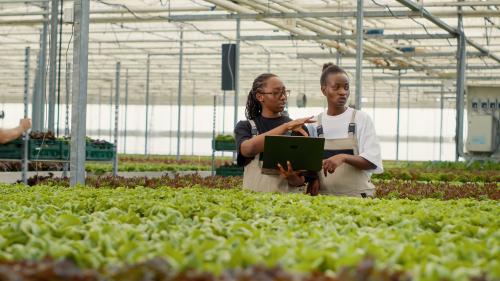Abstract
COVID-19 has had not only far-reaching implications on the Kenya economy as a whole but also varied short-term and long-term impacts on various sectors. This policy brief provides an early assessment of the effects of the COVID-19 pandemic on the selected industries without smokestacks (IWOSS) that is horticulture, information and communication technologies (ICT), and tourism. Kenya’s economic growth in the pre-COVID-19 period was robust and resilient, expanding by 6.3 percent in 2018 and 5.4 percent in 2019. In the absence of COVID-19, the economy was projected to grow by about 6.2 percent in 2020/21. Following the confirmation of the first case of COVID-19 pandemic in March 2020, the Kenyan economy contracted and the IMF estimated that Kenya grew by -0.1 percent in 2020 relative, to a growth of 5.4 percent in 2019. The service sector was the hardest hit. However, within IWOSS, besides tourism and trade and repairs, all the other IWOSS sectors’ share of employment expanded during the COVID period. ICT sector remained resilient and has demonstrated to be an important enabler for firm operations across sectors—through promoting business continuity amid the pandemic. In Kenya, ICT experienced a one-off shock in the March/April 2020 period and recovered strongly thereafter. Horticulture and agriculture have remained to be relatively resilient even with COVID-19 enabling the Country to remain competitive in the global market.
As part of our recommendations, in horticulture, the country will need to: ameliorate the possible effects of the dynamic non-tariff trade barriers (NTTBs) by supporting continuous skills transfer and extension services to local producers, including small-scale farmers; enhance investments in supportive infrastructure, especially feeder roads and cold chain infrastructure such as “cold” collection centers and pack houses; open up more options for transport—especially maritime transport for exports—by investing in a dedicated maritime line to key export destinations. For the ICT sector, key intervention encompass: fast tracking investment in complementary services such as access to electricity and internet connectivity; supporting development of digital skills partly by scaling up digital innovations in education and skills development sectors; and strengthening the ICT legal and policy framework by fast track an all-encompassing policy for e-commerce. Tourism, which was worst hit in the overall economy, should be revived through enhanced innovations and adoption of emerging technologies along the tourism value chain; quickly adopt and enforce COVID-19 containment protocols; promote and/or incentivize domestic tourism; and put in place social protection programs to cushion employees in the sector.







